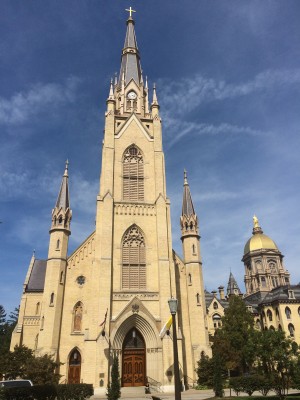I’m speaking at Notre Dame University today, the day that Pope Francis gave his beautiful talk to Congress.
What struck me about his speech was not just what he said, for we’ve heard some of that before, though it never gets old. But what struck me most was the way he said it: softly, slowly, building each idea logically on the last.
We live in an era of bombast. It is everywhere. It’s not just Donald Trump, who personifies it, in my opinion. It’s loud-mouthed, poorly spoken athletes on ESPN. It’s crank screechers on 24-hour news and talk ra dio. Reality show bimbos. It’s the babble of unimportant breaking news that takes up so much space on newspaper websites. The constant yammer on Facebook about stuff that is really personal and ought to be kept that way. We never get a minute to ourselves, it seems.
dio. Reality show bimbos. It’s the babble of unimportant breaking news that takes up so much space on newspaper websites. The constant yammer on Facebook about stuff that is really personal and ought to be kept that way. We never get a minute to ourselves, it seems.
Of course, our national politics is infected with it. Congress appears incapable of doing anything but taking one extreme or the other. Talking points – that’s an interesting concept. “Talk to us about X…” is another – just open your mouth and start talking, implying that thought doesn’t need to occur first.
Thus it was so therapeutic to walk along the quiet paths of the school’s campus and listen to Pope Francis use terms like “cooperation,” “union,” “community.” It was sweet to hear him talk about the monk Thomas Merton.
These themes – or the lack of them in our civic life – are integrally wrapped up in why we have so much heroin abuse in America today.
I believe we’ve spent decades destroying community, mocking and clawing at the girdings of government that provide the public assets and infrastructure that we took for granted and that make communal public life possible. We exalted the private sector, and accepted the free market as some infallible God and thus allowed, encouraged even, jobs to go overseas.
We seemed to fear the public sphere. Parents hover over kids. Alarmed at some menace out in public, they accompany their kids everywhere they go. It all seems connected to a fear of pain, an idea that we can avoid pain, avoid danger. As a country, meanwhile, we have acted as if consumption and the accumulation of stuff was the path to happiness.
We’ve built into our suburbs an isolation that we called prosperity. Added to that mix was the expansion of technology that connects us to the world but separates us from our next-door neighbor.
We wound up dangerously separate from each other – whether in poverty or in affluence.
Kids no longer play in the street. Parks are under-used.
Why then do we wonder that heroin is everywhere?
Heroin turns every addict into narcissistic, self-absorbed, solitary hyper-consumers. A life that finds opiates turns away from family and community and devotes itself entirely to self-gratification by buying and consuming one product – the drug that most makes being alone not just all right, but preferable. It is the final expression of values we have fostered for 35 years.
I believe more strongly than ever that the antidote to heroin is community – doing things with neighbors in public in a way that once came quite naturally.
That’s why I also loved Pope Francis’s speech. He seemed to be touching on the stuff that troubles us as a country most deeply – and for which heroin is just the latest, though perhaps most potent, symptom.
And he did so quietly, softly – which I hope meant that people heard him more clearly.


